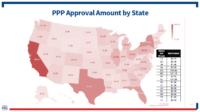In a major victory for LGBTQ workers, the U.S. Supreme Court has issued a wide-ranging ruling stating that employers who fire workers because of their sexual orientation or being transgender violate the 1964 Civil Rights Act’s Title VII, which deals with employment discrimination. [View court's opinion here.]
LGBTQ advocates, including those in the engineering and construction fields, hailed the 6-3 decision, handed down on June 15. But they also said further progress is needed.
For example, they note that a majority of states do not have laws on their books that protect LGBTQ workers from workplace discrimination because of their sexual orientation. They say they will continue to push for federal legislation to codify LGBTQ workplace protections.
The high court’s ruling combined three cases, including two in which plaintiffs said they were fired for stating that they were gay. In the third case, the plaintiff, who worked for a Michigan funeral home, was dismissed for presenting as transgender.
Two federal appeals courts issued rulings allowing plaintiffs' cases to proceed, but a third ruled for the employer.
Writing for the majority, Justice Neil Gorsuch said, "In Title VII, Congress adopted broad language making it illegal for an employer to rely on an employee’s sex when deciding to fire that employee.”
Gorsuch added, “We do not hesitate to recognize today a necessary consequence of that legislative choice: An employer who fires an individual merely for being gay or transgender defies the law. “
The decision's scope is viewed as applying across the board.
Sam Schwartz-Fenwick, an attorney who leads law firm Seyfarth's LGBT affinity group, said in a statement, “With this ruling…the anti-discrimination mandate of Title VII now protects LGBT individuals throughout the country.
Construction, engineering comments
Some advocates foresee an impact in engineering and construction. Guillermo Díaz-Fañas, president of Queer Advocacy & Knowledge Exchange, New York City, said via email that the Supreme Court’s ruling “is certainly a step forward…for the protection of LGBT in the country, especially for those of us working in the construction industry."
Díaz-Fañas, who also is a senior technical principal with WSP USA, added, “The fight for equality, however, is far from over.”
He said that even with the issuance of the court's decision, “negative attitudes and prejudices towards LGBTQIA+ employees persist nonetheless in our field.” He said, “The construction industry is changing slowly, but surely.”
Dredeir Roberts, in-house counsel for Core States Group, a Philadelphia-based architecture, engineering and construction firm, says the court’s decision could encourage more open conversation among workers.
Roberts says, “This ruling could probably allow people to feel a bit safer in their employment status and to pull down those walls of insecurity to allow for a more efficient and productive workplace.”She adds, “But then you have to make sure the company culture is correct.”
Brian Turmail, a spokesman for the Associated General Contractors of America, said in an email sent in early evening on June 15, "We're working through the ruling, but our initial sense is that contractors will be able to comply, since they already must meet similar anti-discrimination measures that have been in place snce the 1960s."
Specifically, Turmail cites a presidential executive order, originally signed by President Lyndon Johnson in 1965 and amended since then. It states that federal contractors must not discriminate in their hiring on the basis of—among other factors—race, religion, sex, sexual orientation and gender identity
The Associated Builders and Contractors said in an emailed statement, "Diversity and inclusion is a foundational principle of ABC, and we are reviewing the decision carefully to understand its impact on the ABC contracting community and help stakeholders ensure that all are welcome to build America."
Looking ahead
National LGBT Chamber of Commerce Co-Founders Justin Nelson and Chance Mitchell said that LGBT advocates will continue to campaign for federal legislation to codify protections.
In particular, they point to the Equality Act, which would bar discrimination based on sex, sexual orientation and gender identity. The House, controlled by Democrats, passed the bill in May 2019 but the measure has yet to move in the Republican-controlled Senate.
Another focus is state legislation. According to advocacy group Human Rights Campaign, 22 states and the District of Columbia have laws in place that prohibit employment discrimination based on sexual orientation and gender identity.
Laurent Drogin, a partner with New York City-based law firm Tarter Krinsky and Drogin, said in a statement that with the Supreme Court’s ruling, “The federal laws will be taking a step forward, but continue to trail far behind state and local laws.”
For example, Drogin cites New York State and New York City human rights statutes that he says provide broader remedies than federal laws do in some respects.
Trump's reaction
The court's majority opinion, written by Gorsuch, a nominee of President Trump, surprised some observers.
Asked by a reporter about the new ruling, Trump said, according to a press pool report, “I’ve read the decision and some people were surprised but they’ve ruled and we live with their decision.” He added that it was a “very powerful decision actually.”





